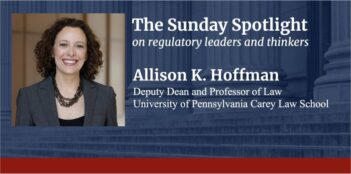
Health care reform, the Dodd-Frank Act, environmental protection, and open government are discussed in our top news posts from 2011.
As 2011 draws to a close, The Regulatory Review reflects back on a year of major regulatory developments around the world. For our daily essay today, as well as our essays for the next two days, we will feature the top 50 essays in The Regulatory Review over the past twelve months, based on the number of page views. Today we feature, in chronological order, the top news stories from among our top overall essays, while tomorrow and the following day we will feature the top analysis and opinion essays, respectively.
Federal Courts Split on Constitutionality of Individual Mandate in Health Care Law
Penn Program on Regulation | February 15
The 2010 Patient Protection Affordable Care Act calls for the creation of insurance exchanges within each state, bans discrimination against patients with pre-existing conditions, and requires all Americans to purchase some form of health insurance. This last strategy, the individual mandate, has prompted a series of lawsuits by opponents who claim the law exceeds Congress’ authority under the Commerce Clause, which gives the federal government authority over economic activity. They argue that individual decisions not to buy health insurance are forms of inactivity.
 Ongoing Litigation in Human Embryonic Stem Cell Research
Ongoing Litigation in Human Embryonic Stem Cell Research
Joel Outten | March 8
The Obama Administration faces ongoing lawsuits challenging financial support of human embryonic stem cell (hESC) research.
 Consumer Financial Protection Bureau Updates: New Website, Future Headquarters
Consumer Financial Protection Bureau Updates: New Website, Future Headquarters
Sean Moloney | March 23
The Consumer Financial Protection Bureau (“CFPB”), the highly publicized federal agency established by the Dodd-Frank Wall Street Reform and Consumer Protection Act, is beginning to take form online and in Washington, D.C.
 The Federal Reserve Issues a New Rule Restricting Mortgage Brokers’ Compensation
The Federal Reserve Issues a New Rule Restricting Mortgage Brokers’ Compensation
Samson Chen | March 25
 Coming Soon! New The Regulatory Review Format . . . and a Celebration and Contest
Coming Soon! New The Regulatory Review Format . . . and a Celebration and Contest
Jonathan Mincer | March 29
The Regulatory Review proudly announces that on April 5th we will be posting to a new, enhanced website that better reflects our extensive reporting and analysis of cutting-edge policy issues.
 Dodd-Frank Implementation Faces Strong Congressional Opposition”
Dodd-Frank Implementation Faces Strong Congressional Opposition”
Joseph Santo | March 30
Some members of Congress are attempting to moderate the pace of implementation of the Dodd-Frank Act by seeking to limit appropriations for implementing agencies and by introducing legislation to amend or repeal parts of the Act.
 Scholars Debate Whether the Administrative Procedure Act Provides Sufficient Transparency
Scholars Debate Whether the Administrative Procedure Act Provides Sufficient Transparency
Robert Jackel | March 31
 Texas and EPA Battle Over Greenhouse Gas Regulations
Texas and EPA Battle Over Greenhouse Gas Regulations
Benjamin Thomas | May 9
The State of Texas is now pursuing its legal battle against the Environmental Protection Agency’s greenhouse gas (GHG) regulations in the D.C. Circuit. In February, the Fifth Circuit granted the EPA’s motion to transfer the pending litigation to the D.C. Circuit.
 Washington Workshop on Assessing Open Government
Washington Workshop on Assessing Open Government
Sean Moloney | May 18
On his first day as President, Barack Obama announced his administration’s “commitment to creating an unprecedented level of openness in government.” Since then, the Obama Administration has implemented a major Open Government Initiative to increase transparency, participation, and collaboration across the federal government.
 Federal Judge Rejects Amended Google Books Settlement
Federal Judge Rejects Amended Google Books Settlement
Abigail Slater | May 31
Judge Denny Chin, then on the District Court for the Southern District of New York, recently rejected a proposed settlement agreement between Google and a class representing book authors and publishers. The rejection followed objections from the Antitrust Division of the Department of Justice (DOJ) and may presage other antitrust scrutiny of Google.
 House Passes Resolution Disapproving of Net Neutrality
House Passes Resolution Disapproving of Net Neutrality
Brian Hunt | June 1
The House of Representatives passed Joint Resolution 37 on April 15, 2011, expressing disapproval of the net neutrality rules the Federal Communications Commission (FCC) adopted last December. The resolution – along with a similar one pending in the Senate – marks the latest chapter in an ongoing Congressional debate over government regulation of consumer internet access.
 Recent Supreme Court Decisions Interpret the Freedom of Information Act
Recent Supreme Court Decisions Interpret the Freedom of Information Act
Thomas Cockriel | August 4
In a series of cases decided this past term, the Supreme Court clarified provisions of the Freedom of Information Act (FOIA), which requires federal agencies to disclose information to the public upon request. The Act mandates broad disclosure but also contains nine important exemptions to its disclosure requirements.
 FINRA Executive Compensation Challenged by Member Firms
FINRA Executive Compensation Challenged by Member Firms
Aulden Burcher | August 15
 11th Circuit Finds Affordable Care Act’s Individual Mandate Unconstitutional
11th Circuit Finds Affordable Care Act’s Individual Mandate Unconstitutional
Elisa Solomon | August 18
 Obama Asks EPA to Delay Ozone Standards
Obama Asks EPA to Delay Ozone Standards
Sebastian Rowland | September 5
 DEA Plans Ban on ‘Bath Salts’ and ‘Plant Food’
DEA Plans Ban on ‘Bath Salts’ and ‘Plant Food’
Annie Chou | September 28
 House Gives EPA 15 More Months to Promulgate New Boiler Rules
House Gives EPA 15 More Months to Promulgate New Boiler Rules
Chip Shaffer | October 19




